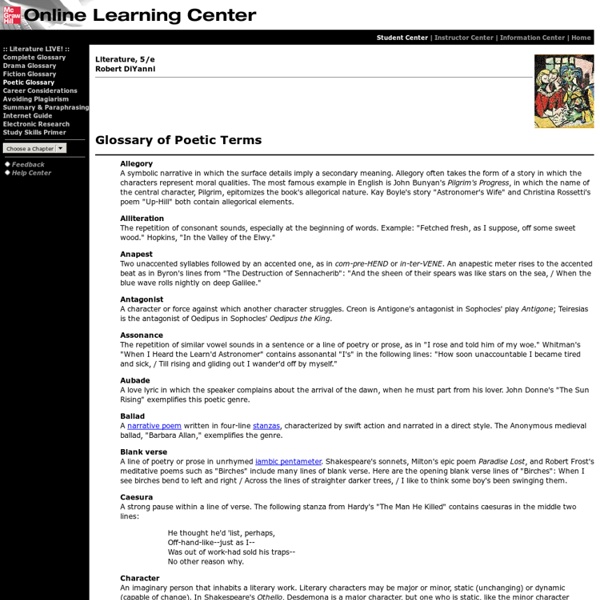Glossary of Poetic Terms

Favorite Poem Project
*Now Accepting Applications for our annual Summer Poetry Institute for Educators, July 14-18, 2014! Revitalizing Poetry in the Classroom One of the Favorite Poem Project's significant goals is to enhance and improve the teaching of poetry in the nation's elementary, middle and high school classrooms. The study of poetry, Robert Pinsky believes, is crucial in the modern world. "Poetry connects us with our deep roots," says Pinsky, "our evolution as an animal that created rhythmic language as a means of transmitting vital information across the generations. Summer Poetry Institutes Call for Applications The poetry institute was a reaffirmation of why I love poetry as well as a reminder of why I became a teacher. The Favorite Poem Project, in cooperation with the Boston University School of Education, is accepting applications for the eleventh annual Poetry Institute for Educators at Boston University, July 14-18, 2014. FPP Materials A Unique Opportunity Tuition Housing Parking Facilities
Eighth Grade
Eighth grade students examine the roles of people, events, and issues in North Carolina history that have contributed to the unique character of the state today. Building on the fourth grade introduction, the time frame for this course emphasizes revolutionary to contemporary times. The organization is primarily chronological and reference is made to the key national phenomena that impacted North Carolina throughout these periods. Although the value and methods of historical study as a way of learning about people are stressed, key concepts of geography, civics, and economics are incorporated throughout the course for a fuller understanding of the significance of the people, events, and issues. Inherent to the study of North Carolina history is a continuing examination of local, state, and national government structures. << Back | Table of Content | Next >>
Spotlight
Table of Contents to this Poetry Unit Poetry Lessons for Teachers and Students I have tried to preview all links; however, time constraints and constantly changing links create some uncertainly about all links being absolutely safe links at all times. Hint: Good introduction to poetry - Show the CD, "The New Kid on the Block." OBJECTIVES for this unit: .............. Here are some links that will help (several links are for locating images and sounds) introduce your poetry unit: Poetry is truth in its Sunday clothes. Joseph Roux (1834-86), French priest, writer. Introductory to Poetry *Please notice that many of these poetry lessons includes a lesson for students and a teacher lesson plan for help in delivery of the lesson. If time permits, as a culminating project, allow the students to write their own poem(s) and use PowerPoint or Hyperstudio to make it or them interactive like the CD, "The New Kid on the Block." Lesson 1........Figurative Language for the student Lesson 3........
Related:
Related:



